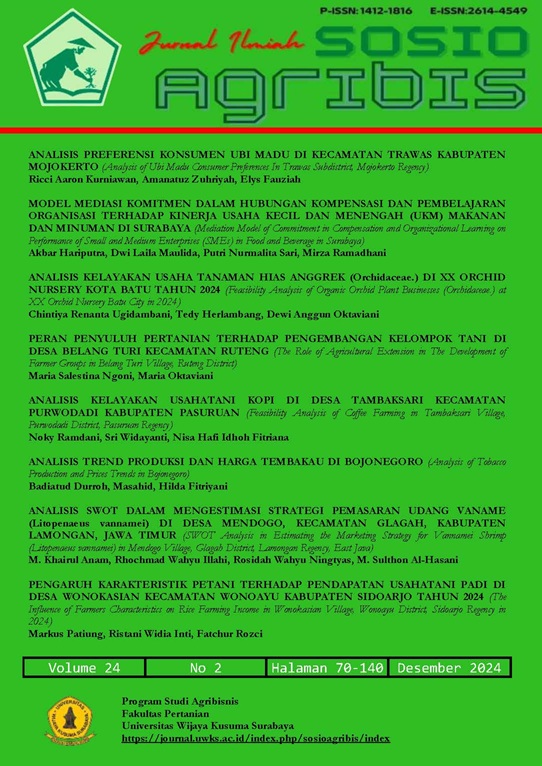ANALISIS SWOT DALAM MENGESTIMASI STRATEGI PEMASARAN UDANG VANAME (Litopenaeus vannamei) DI DESA MENDOGO, KECAMATAN GLAGAH, KABUPATEN LAMONGAN, JAWA TIMUR (SWOT Analysis in Estimating The Marketing Strategy For Vannamei Shrimp (Litopenaeus vannamei) in Mendogo Village, Glagah District, Lamongan Regency, East Java)
DOI:
https://doi.org/10.30742/jisa24220244155Abstract
The marketing process carried out by Vannamei shrimp farmers in Mendogo Village consists solely of selling their shrimp to local collectors within the village. The purpose of this study is to analyze marketing strategies to increase the added value of Vannamei shrimp produced by farmers in Mendogo Village, Glagah District, Lamongan Regency. This research employs a descriptive quantitative method. Data were collected from informants as primary and secondary sources through interviews, observations, and documentation relevant to the study. The data analysis technique used is SWOT analysis, which involves strategy formulation through the stages of data collection (evaluation of external and internal factors), analysis (SWOT Matrix), and decision-making. The results of the study indicate that the SO (Strengths-Opportunities) strategy is highly effective in enhancing the added value of Vannamei shrimp in Mendogo Village by utilizing farmers' strengths, such as product quality and market relationships, to seize opportunities. The focus includes improving product quality, maintaining environmental cleanliness, and implementing appropriate marketing strategies to strengthen competitiveness in the market.
Keywords: Marketing Strategy, Vannamei, SWOT Analysis, LamonganDownloads
Published
Issue
Section
License
- The author retains copyright and grants the journal the right of first publication with the work being simultaneously licensed under the Creative Commons Attribution License which allows others to share the work with acknowledgment of the work's authorship and initial publication in this journal.
- Authors may make additional separate contractual arrangements for the non-exclusive distribution of the published journal version of the work (for example, posting it to an institutional repository or publishing it in a book), with acknowledgment of its initial publication in this journal.
- Authors are permitted and encouraged to post their work online (for example, in institutional repositories or on their websites) before and during the submission process, as it can result in a productive exchange, as well as earlier and larger citations of published work (See The Influence Open Access).




